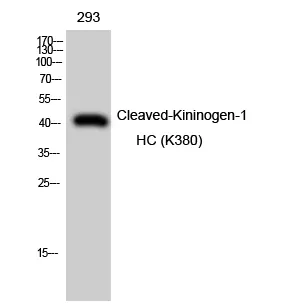
Size:50μL Price:$118
Size:100μL Price:$220
Size:200μL Price:$380
Application:WB,ELISA
Reactivity:Human,Rat,Mouse
Conjugate:Unconjugated
Optional conjugates: Biotin, FITC (free of charge). See other 26 conjugates.
Gene Name:KNG1
Summary
| Production Name | Cleaved-Kininogen-1 HC (K380) Rabbit Polyclonal Antibody |
| Description | Rabbit polyclonal Antibody |
| Host | Rabbit |
| Application | WB,ELISA |
| Reactivity | Human,Rat,Mouse |
Performance
| Conjugation | Unconjugated |
| Modification | Unmodified |
| Isotype | IgG |
| Clonality | Polyclonal |
| Form | Liquid |
| Storage | Store at 4°C short term. Aliquot and store at -20°C long term. Avoid freeze/thaw cycles. |
| Buffer | Liquid in PBS containing 50% glycerol, 0.5% protective protein and 0.02% New type preservative N. |
| Purification | Affinity purification |
Immunogen
| Gene Name | KNG1 |
| Alternative Names | KNG1; BDK; KNG; Kininogen-1; Alpha-2-thiol proteinase inhibitor; Fitzgerald factor; High molecular weight kininogen; HMWK; Williams-Fitzgerald-Flaujeac factor |
| Gene ID | 3827 |
| SwissProt ID | P01042 |
Application
| Dilution Ratio | WB 1:500-1:2000,ELISA 1:5000-1:20000 |
| Molecular Weight | 41kDa |
Background
This gene uses alternative splicing to generate two different proteins- high molecular weight kininogen (HMWK) and low molecular weight kininogen (LMWK). HMWK is essential for blood coagulation and assembly of the kallikrein-kinin system. Also, bradykinin, a peptide causing numerous physiological effects, is released from HMWK. Bradykinin also functions as an antimicrobial peptide with antibacterial and antifungal activity. In contrast to HMWK, LMWK is not involved in blood coagulation. Three transcript variants encoding different isoforms have been found for this gene.[provided by RefSeq, Nov 2014],disease:Defects in KNG1 are the cause of high molecular weight kininogen deficiency (HMWK deficiency) [MIM:228960]. HMWK deficiency is an autosomal recessive coagulation defect. Patients with HWMK deficiency do not have a hemorrhagic tendency, but they exhibit abnormal surface-mediated activation of fibrinolysis.,function:(1) Kininogens are inhibitors of thiol proteases; (2) HMW-kininogen plays an important role in blood coagulation by helping to position optimally prekallikrein and factor XI next to factor XII; (3) HMW-kininogen inhibits the thrombin- and plasmin-induced aggregation of thrombocytes; (4) the active peptide bradykinin that is released from HMW-kininogen shows a variety of physiological effects: (4A) influence in smooth muscle contraction, (4B) induction of hypotension, (4C) natriuresis and diuresis, (4D) decrease in blood glucose level, (4E) it is a mediator of inflammation and causes (4E1) increase in vascular permeability, (4E2) stimulation of nociceptors (4E3) release of other mediators of inflammation (e.g. prostaglandins), (4F) it has a cardioprotective effect (directly via bradykinin action, indirectly via endothelium-derived relaxing factor action); (5) LMW-kininogen inhibits the aggregation of thrombocytes; (6) LMW-kininogen is in contrast to HMW-kininogen not involved in blood clotting.,online information:High molecular weight kininogen entry,polymorphism:The T-kinin peptide is missing residues 378 to 380, probably as a result of a naturally occurring variant. The complete sequence of the T-kinin peptide is therefore ISRPPGFSPFR. This peptide is associated with malignant tumors but not with benign ones.,PTM:Bradykinin is released from kininogen by plasma kallikrein.,PTM:Hydroxylation of Pro-383 occurs prior to the release of bradykinin.,similarity:Contains 3 cystatin domains.,tissue specificity:Plasma. T-kinin is detected in malignant ovarian, colon and breast carcinomas, but not in benign tumors.,
Research Area
Complement and coagulation cascades;
